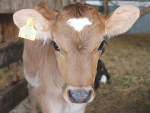IHC is hoping farmers who’ve previously supported its annual calf and rural scheme by donating animals for auction will this year give cash.
For the first time in 33 years IHC has cancelled the auctions because of the risk of spreading Mycoplasma bovis.
The scheme usually raises about $1 million a year – $1.4m last year – a big chunk of IHC’s $9m annual donations budget.
About three-quarters of it comes from live calves collected and sold at about 18 separate auctions. The rest comes from ‘virtual’ calves, straight donations or pledges of donations matching the auction prices.
“About 4000 farmers participate and it’s a part of the fabric and culture of rural NZ,” Greg Miller, IHC’s national manager of fundraising, told Rural News.
Miller says IHC had thought long and hard – talking with MPI, farmers and auctioneers PGG Wrightson – before cancelling the auctions.
There are other ways people can support the scheme, but there was too much risk in the calf auctions “for this year, anyway,” Miller says.
IHC has tightened its biosecurity in recent years, only picking up animals with proper NAIT tags and animal status declaration (ASD) forms.
But the risk was too high and IHC could not put farmers’ livelihoods at risk. It was too crucial a time for MPI and the industry as they tried to determine whether Mycoplasma bovis could be eradicated.
“It is not right at such a crucial period where they’re assessing whether it’ll work, for us to do such a big calf movement,” he says. “We have determined there should neither be IHC-organised trucking of weaned calves to sales, nor IHC calf sale days.”
Miller says IHC must do what is right for NZ farmers’ livelihoods and long-term sustainability.
“We are keeping up to date with the latest findings, and are working to gather the best data possible, to determine how the scheme will operate in the future.”
He says IHC supports people with intellectual disabilities and their families in rural communities.
To support the virtual calf scheme, by donating $300 in lieu of a calf, can visit www.ihc.org.nz/pledge



















